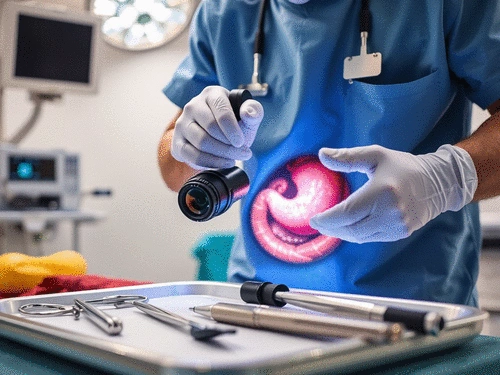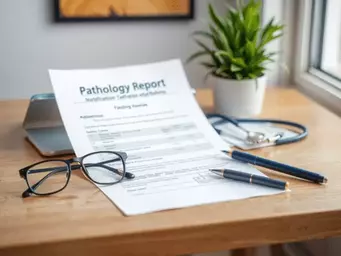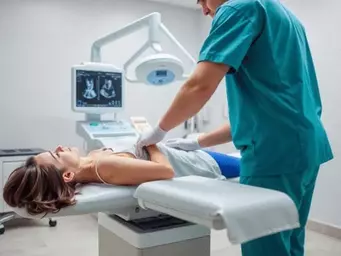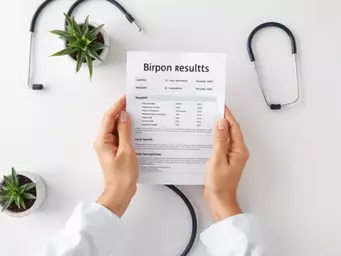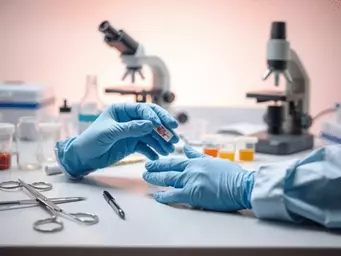Feeling anxious about an endoscopic biopsy? You're not alone. Many patients find comfort in understanding what this procedure involves. The key is knowledge—so let’s break down what you need to know to feel empowered during your healthcare journey.
What You Will Learn
- An endoscopic biopsy is a minimally invasive procedure that involves removing tissue samples for diagnostic purposes.
- This procedure is vital for accurately diagnosing various gastrointestinal disorders, including cancers.
- Endoscopic biopsies allow for early detection of diseases, improving treatment outcomes.
- Understanding the process can reduce anxiety and empower you to engage actively in your health decisions.
- Close communication with your healthcare provider before and after the procedure is essential for addressing any concerns.
- Histopathology plays a critical role in interpreting biopsy results, guiding subsequent treatment options.
The Endoscopic Biopsy Process: Key Stages and Analysis
An endoscopic biopsy is a crucial diagnostic procedure. This visual outlines the typical process flow and how the samples are analyzed to provide critical medical insights.
Stage 1
Tissue Sample Collection
During endoscopy, a small tissue sample is precisely removed from the area of concern using specialized instruments.
Stage 2
Pathological Analysis (Histopathology)
The collected tissue is sent to a pathologist for microscopic examination (histopathology) to identify abnormal cells or diseases.
Stage 3
Diagnosis & Treatment Guidance
Pathology findings guide doctors in accurate diagnosis, differentiating benign from malignant, and forming treatment plans.
Stage 4
Patient Follow-up & Care
Post-biopsy, patients are encouraged to follow up with their providers for results discussion, further questions, and next steps.
Understanding Endoscopic Biopsy: Definition and Purpose
An endoscopic biopsy is a specialized procedure that involves the removal of tissue samples from the body using an endoscope. An endoscope is a flexible tube equipped with a camera and light, which allows doctors to visualize internal organs and structures. The main goal of this biopsy is to obtain a sample for diagnostic purposes, helping to identify diseases, including cancer. Understanding the nuances of this procedure can help alleviate some of the anxiety associated with it!
The significance of an endoscopic biopsy lies in its ability to provide insights into conditions that might not be detectable through imaging alone. By directly accessing the target area, healthcare providers can ensure that the samples are precisely taken, which increases the accuracy of the diagnosis.

What Is an Endoscopic Biopsy?
An endoscopic biopsy is a procedure conducted with the aid of an endoscope, which is inserted through natural openings in the body, such as the mouth or rectum. This method allows for a visual examination of organs like the esophagus, stomach, and colon. During the biopsy, a small piece of tissue is extracted from the area of concern for further analysis. It’s a minimally invasive way to gather crucial information about a patient’s health.
- The procedure is performed under sedation, ensuring patient comfort.
- It is essential for diagnosing gastrointestinal disorders, including cancers.
- Results can help guide appropriate treatment plans.
As someone who regularly discusses biopsy procedures on my platform, I can assure you that knowledge is a powerful tool in reducing fear! Knowing what to expect can empower you to engage actively in your health journey.
The Role of Endoscopic Biopsy in Medical Diagnostics
Endoscopic biopsies play a pivotal role in modern medical diagnostics. They not only aid in identifying conditions but also help in monitoring the progress of diseases. By obtaining a tissue sample, doctors can evaluate cellular characteristics, which helps in determining the nature of a lesion or abnormality.
- They assist in detecting early-stage cancers, leading to better outcomes.
- They allow for the differentiation between benign and malignant lesions.
- They can provide guidance on treatment options based on the biopsy results.
It’s important to understand that while a biopsy can sound intimidating, it is an essential step in ensuring that you receive the right care. My aim at What Is A Biopsy is to empower you with information so that these procedures feel less daunting.
Importance of Biopsy in Cancer Screening and Chronic Conditions
Biopsies, particularly endoscopic ones, are crucial in cancer screening and the management of chronic conditions. They help detect cancers at early stages, which is often when treatment is most effective. Additionally, biopsies are valuable for chronic conditions such as inflammatory bowel disease, helping monitor the disease’s progression and response to treatments.
- They facilitate early intervention, potentially saving lives.
- They provide critical insights for managing chronic diseases effectively.
- They enhance patient-provider communication about health status.
In my experience, many patients find comfort in knowing that these procedures are designed to provide clarity and direction in their healthcare journey. By understanding the importance of biopsies, you can approach your health decisions with confidence!
Pro Tip
Did you know? Preparing for your endoscopic biopsy can make a significant difference in your experience! Consider writing down any questions you have for your healthcare provider before the procedure. This will help ensure you feel informed and confident going into your biopsy, making the process less daunting.
FAQs About Endoscopic Biopsy: Common Questions Answered
What are the main reasons for an endoscopic biopsy?
Endoscopic biopsies are primarily performed to diagnose various gastrointestinal disorders, including cancers, inflammatory bowel disease, and other abnormalities. They provide detailed insights into tissue health that imaging alone cannot offer.
Is an endoscopic biopsy a painful procedure?
The procedure is typically performed under sedation, which helps minimize discomfort. Most patients report feeling little to no pain during the biopsy itself. You may experience some mild discomfort or soreness afterward, but this usually subsides quickly. The American Society for Gastrointestinal Endoscopy provides guidelines to ensure patient comfort and safety throughout the process.
How long does it take to get endoscopic biopsy results?
The time it takes to receive biopsy results can vary, but it typically ranges from a few days to a week or two. This period allows pathologists to thoroughly analyze the tissue samples. Your healthcare provider will inform you when to expect your results.
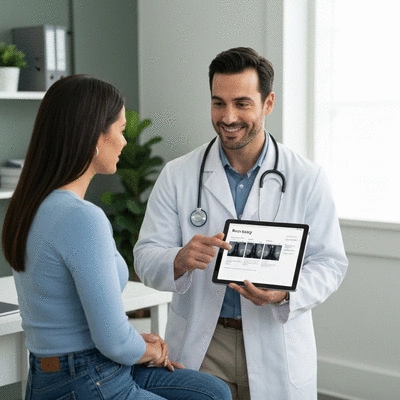
What is histopathology and why is it important for biopsy analysis?
Histopathology is the microscopic examination of tissue samples by a pathologist to diagnose diseases. It is crucial for biopsy analysis because it helps identify abnormal cells, determine the nature of lesions (benign or malignant), and classify specific types of diseases, which directly guides treatment decisions. The detailed analysis provided by histopathology is fundamental for an accurate diagnosis.
What should I do after my endoscopic biopsy?
After your endoscopic biopsy, it's important to follow your doctor's post-procedure instructions, which may include dietary restrictions or activity limitations for a short period. You should also attend your follow-up appointment to discuss your results and any next steps with your healthcare provider. Don't hesitate to contact them if you have any lingering questions or concerns.
Summarizing Key Insights on Endoscopic Biopsy
As we wrap up our discussion on endoscopic biopsy, it's essential to highlight the critical points we've covered. This procedure, often performed during an upper endoscopy or colonoscopy, plays a significant role in diagnosing various medical conditions. From understanding what an endoscopic biopsy entails to its importance in medical diagnostics, we've explored how it can provide valuable insights into your health. Remember, knowledge is power, especially when it comes to your healthcare decisions!
To put it simply, an endoscopic biopsy allows doctors to collect tissue samples from areas that may be problematic. This helps in diagnosing diseases, particularly cancer, and can guide treatment plans. If you have any lingering questions or concerns about the process, feel free to reach out!
Encouragement to Follow Up with Healthcare Providers for Concerns
It's perfectly normal to feel a mix of emotions after an endoscopic biopsy. If you're feeling anxious or uncertain, I encourage you to follow up with your healthcare provider! They are there to support you, answer your questions, and help you understand your results.
- Keep a list of any questions you think of after your procedure.
- Don't hesitate to call your doctor for clarification on your results.
- Ask about any further tests or follow-up procedures if needed.
Staying connected with your healthcare team is vital. They can provide guidance and reassurance as you navigate your recovery and any necessary next steps!
Recap of Key Points
- An endoscopic biopsy is a minimally invasive procedure to obtain tissue samples for accurate diagnosis.
- It is crucial for detecting early-stage cancers and differentiating between benign and malignant lesions.
- Biopsies provide valuable insights for managing chronic conditions and monitoring disease progression.
- Patient comfort is prioritized during the procedure, often conducted under sedation.
- Clear communication with healthcare providers is essential for understanding results and next steps.

